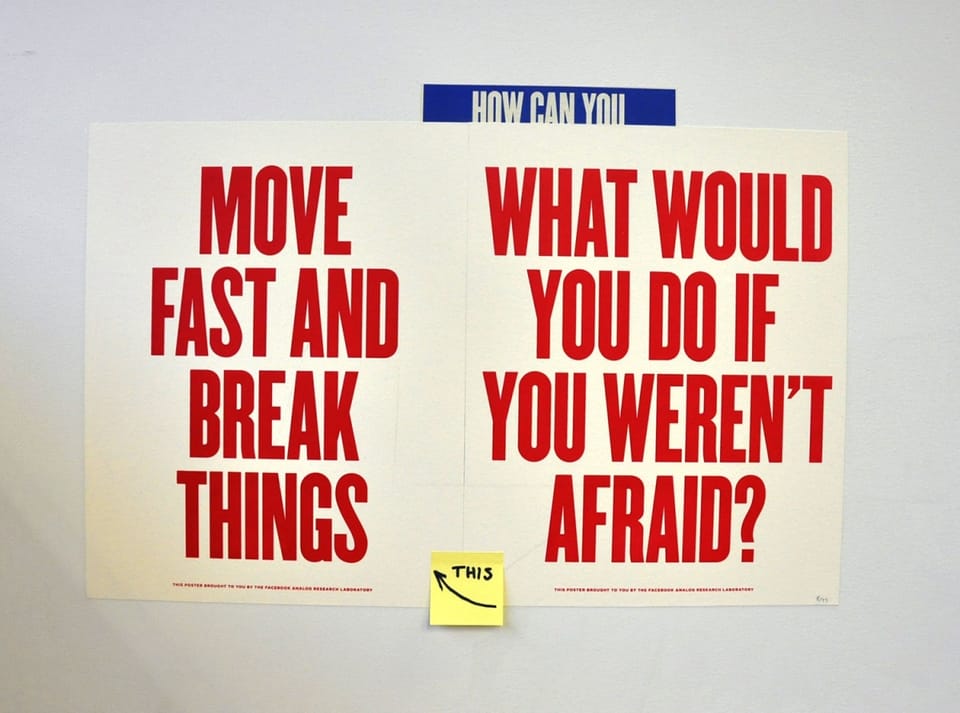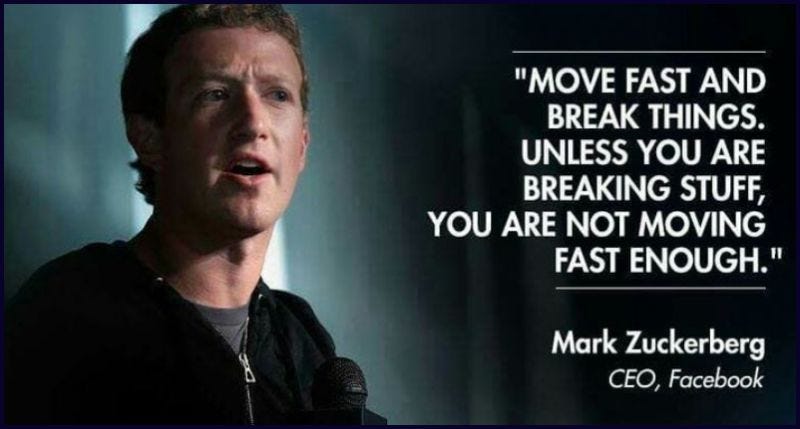Hacker Culture
(2025-08-17T03:08.725Z)
Perplexity Query
(2025-08-17T03:08
.725Z)
Question:
Write a comprehensive one-page article about "Hacker Culture, move fast and break things".
Response from sonar-pro:
Hacker Culture, Move Fast and Break Things
Introduction
Hacker culture, especially encapsulated by the mantra "move fast and break things," describes a philosophy of relentless innovation that prioritizes rapid iteration and experimentation over caution and perfectionism.
[c3wzpp]
[p4glhf]
Popularized by Facebook (now Meta), this mindset has significantly shaped the modern tech industry, influencing how products are developed and scaled in a fast-paced, competitive world.
[p4glhf]

Main Content
At its core, the "move fast and break things" philosophy—a central tenet of hacker culture—encourages developers to release new features quickly, learn from mistakes, and continually iterate.
[vx9ibg]
[p4glhf]
Rather than waiting for a perfect product, teams are urged to launch early prototypes, collect user feedback, and improve by making incremental changes. This methodology is built on the belief that progress is better achieved through action and experimentation than endless planning, and that minor failures are a necessary part of success.
[vx9ibg]
[dzrnm0]
A practical example is Facebook itself: during its early growth, engineers would regularly deploy code updates, running thousands of live experiments at any given time to assess which features resonated with users.
[vx9ibg]
Another classic case is the early days of startups like Uber and Airbnb, both of which launched Minimum Viable Product (MVPs) to test markets before refining their platforms. The slogan “Done is better than perfect,” famously painted on Facebook’s walls, underscores a similar value—emphasizing the benefit of shipping imperfect but functional products to gain real-world insights quickly.
[vx9ibg]
The benefits of this approach are clear: companies can outpace competitors, rapidly adapt to changing user needs, and foster a meritocratic environment where implementation and results outweigh seniority or bureaucracy.
[vx9ibg]
[c3wzpp]
It’s especially powerful in areas where being first to market provides a critical edge, such as social media, financial technology, and artificial intelligence.
However, there are intrinsic challenges and ethical considerations.
[2tamdq]
Moving too fast can introduce bugs, destabilize critical systems, or create unintended consequences—such as breaches of user privacy or public trust. Critics argue that reckless innovation can enable harmful outcomes, evidenced by public backlash when platforms roll out poorly tested features or fail to consider moral impacts in the pursuit of growth.
[2tamdq]
Thoughtful leaders now recognize the need to balance innovation with responsibility, ensuring that "breaking things" doesn’t come at the expense of safety or ethics.
[2tamdq]

Current State and Trends
Today, "move fast and break things" has evolved as both a slogan and a practical methodology within technology organizations.
[p4glhf]
[c3wzpp]
While Meta (formerly Facebook) remains its most prominent proponent, the ethos is widespread among technology startups and major players in Silicon Valley. Modern development teams rely on immersive testing environments, continuous integration pipelines, and robust logging to minimize the downside risk while maximizing speed.
[vx9ibg]
[c3wzpp]
Key players adopting or adapting the philosophy include Google, Amazon, and hundreds of agile startups. Yet, the market has seen a shift toward more balanced mantras—such as "move fast with stable infrastructure"—reflecting a growing awareness of stability and public accountability.
[p4glhf]
[2tamdq]
Recent developments in regulatory scrutiny and ethical AI have further tempered the willingness to sacrifice caution for speed, as firms recognize the potential costs of unchecked disruption.
[2tamdq]

Future Outlook
Looking ahead, the future of hacker culture and the “move fast and break things” mantra is likely to involve a greater integration of ethical considerations, responsible innovation, and robust risk management. As technology becomes more deeply embedded in society, organizations will need to pair speed with safeguards, ensuring creativity and agility are matched by concern for user impact and societal consequences.
[2tamdq]
Conclusion
Hacker culture’s “move fast and break things” philosophy has fueled unprecedented innovation—but its future depends on blending speed with responsibility. As the technology landscape evolves, finding this balance will define which organizations lead and which ones get left behind.
Citations
[p4glhf] 2025, Mar 07. Why you shouldn't move fast and break things - LeadDev. Published: 2024-10-07 | Updated: 2025-03-07
[vx9ibg] 2025, Aug 07. The Hacker Way - Startup Lessons Learned. Published: 2012-02-01 | Updated: 2025-08-07
[c3wzpp] 2025, Aug 15. Facebook's 'Move Fast and Break Things' Mantra - Culture Clash. Published: 2025-08-15
[dzrnm0] 2024, Nov 20. The Fallacy of Move Fast and Break Things | Hacker News. Published: 2020-03-23 | Updated: 2024-11-20
[2tamdq] 2025, Aug 06. Do we really need to 'move fast and break things'? - Ethical Systems. Published: 2023-11-14 | Updated: 2025-08-06